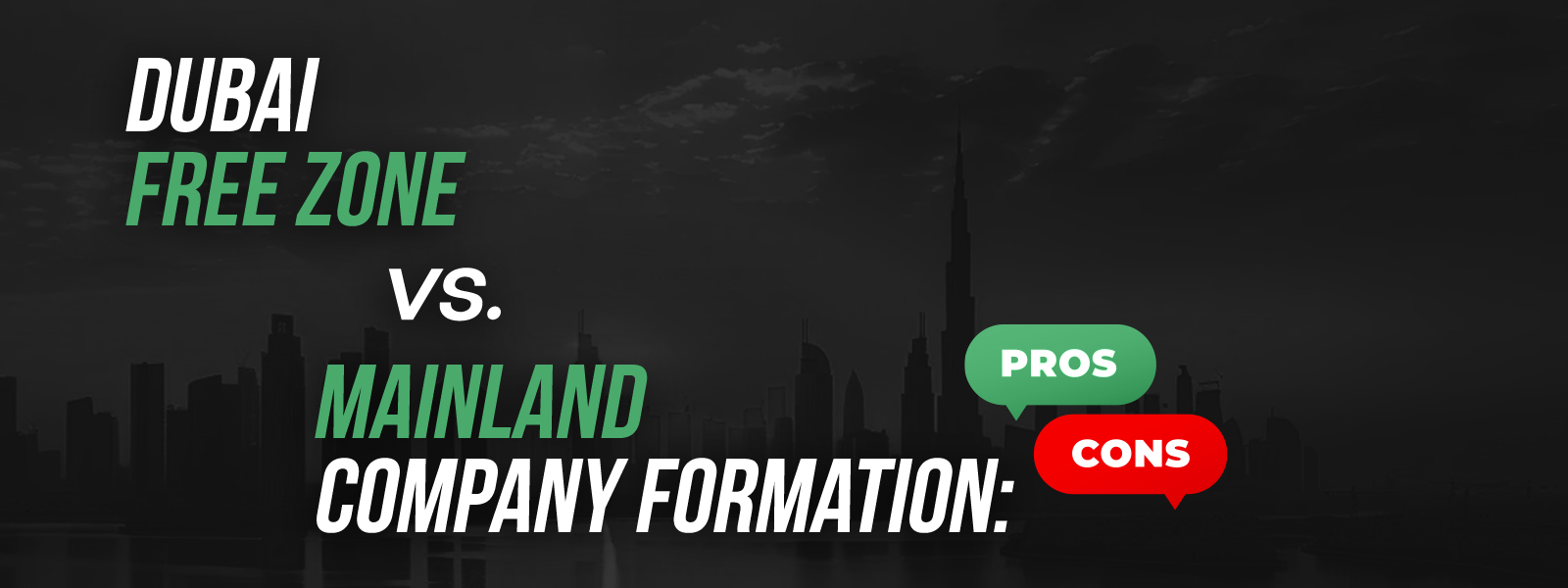Dubai is a powerhouse for business growth, and if you are looking to establish a company here, choosing between a Free Zone and a Mainland setup could shape your entire strategy. When considering starting a business in Dubai, entrepreneurs often choose between establishing a company in a free zone or on the mainland. Each option has unique advantages and disadvantages, significantly impacting business operations, growth potential, and overall success. This blog explores the pros and cons of free zone and mainland company formation in Dubai, helping you make an informed decision.
Overview of Dubai’s Business Landscape
Dubai is renowned for its vibrant economy, strategic location, and business-friendly regulations. The emirate has become a global hub for trade and investment, attracting entrepreneurs worldwide. Understanding the differences between free zone and mainland company formation is crucial for anyone looking to tap into this dynamic market.
Free Zone Company Formation
Pros of Free Zone Companies
100% Foreign Ownership: One of the most appealing aspects of free zones is allowing foreign investors to own their businesses entirely without needing a local sponsor.
Tax Benefits: Free zone companies enjoy significant tax advantages, including 9% corporate tax and no import/export duties, which can significantly enhance profitability.
Efficient Setup Process: Establishing a business in a free zone is generally quicker and less bureaucratic than in the mainland, with dedicated authorities ensuring a streamlined registration process.
Access to Global Markets: Free zones are strategically located to facilitate international trade, providing easy access to global markets through advanced logistics and infrastructure.
Customs Privileges: Businesses operating in free zones benefit from customs duty exemptions on imports and exports, allowing for cost-effective operations.
Cons of Free Zone Companies
Limited Market Access: Free zone companies can only directly engage with the UAE local market if they partner with a local distributor, hindering growth opportunities.
Specific Business Activities: Each free zone has regulations regarding permissible business activities, which may limit operational flexibility.
High Operational Costs: While setup costs can be lower, ongoing expenses such as annual renewal fees and office space rentals can be substantial.
Dependence on Free Zone Authorities: Businesses must comply with regulations set by free zone authorities, which can change and affect operations unpredictably.
Mainland Company Formation
Pros of Mainland Companies
Unrestricted Market Access: Mainland companies can operate freely throughout Dubai and the broader UAE market without restrictions on trading activities, allowing for direct engagement with consumers and government entities.
Diverse Business Opportunities: The Department of Economic Development (DED) lists over 3,000 permissible activities for mainland companies, providing greater flexibility to adapt to market demands.
Full Ownership Options: Recent regulatory changes now allow 100% foreign ownership in many sectors without needing a local sponsor, giving entrepreneurs more control over their businesses.
Ability to Bid for Government Contracts: Mainland companies have the opportunity to participate in lucrative government projects, which can significantly boost growth prospects.
Flexible Office Locations: Entrepreneurs can choose offices anywhere in Dubai, facilitating more accessible access to clients and markets.
Cons of Mainland Companies
Potential Local Sponsorship Requirements: Some mainland companies may still require a local sponsor or partner depending on the business activity, complicating ownership structures.
Higher Setup Complexity: Due to additional regulatory requirements, establishing a mainland company can be more complex than in free zones.
Administrative Burden: Mainland businesses may face more stringent compliance measures and financial audits than their free zone counterparts.
Comparative Analysis
| Features | Free Zones Companies | Mainland Companies |
| Ownership | 100% foreign ownership | 100% foreign ownership (in many sectors) |
| Market Access | Limited access to UAE market | Unrestricted access to UAE market |
| Taxation | 9% corporate tax | 9% corporate tax; 5% VAT applies |
| Setup Process | Quick and streamlined | More complex with additional requirements |
| Business Activities | Restricted by specific zone regulations | Over 3,000 permissible activities |
| Government Contracts | Not eligible | Eligible for government contracts |
| Office Flexibility | Limited to specific locations | Flexible office location choices |
Conclusion
Ultimately, your business goals, operational needs, and target markets will determine your choice between a free zone and a mainland company formation in Dubai.
Free zones offer significant advantages, such as full foreign ownership and tax benefits, but they come with limitations on market access and operational flexibility. Conversely, mainland companies provide unrestricted access to the local market and diverse business opportunities but may involve more complex setup processes and potential local sponsorship requirements.
Before deciding, research your industry requirements thoroughly and consider consulting with professionals specializing in UAE business formation. This will ensure you select the best option tailored to your needs while effectively navigating Dubai’s dynamic business landscape.






















